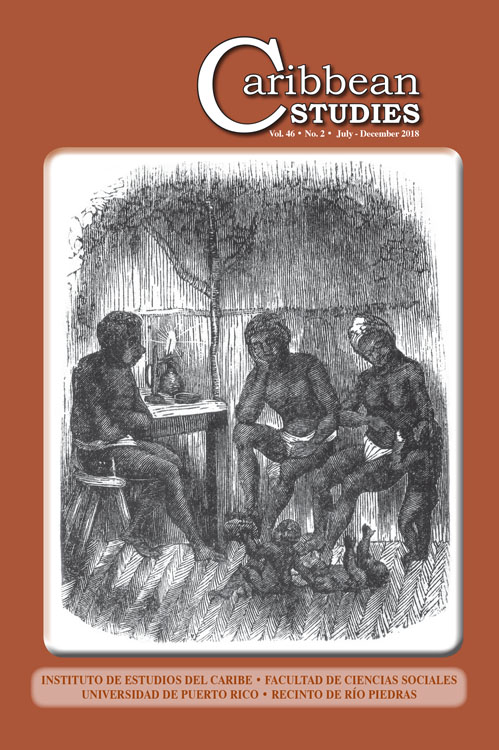Abstract
The article explores how the novel Trilogía sucia de la Habana (1998), by Pedro Juan Gutiérrez, depicts the decline of the subject identity heavily constructed by the paternalist ideology, promises and morals of the Cuban nation-state during the revolutionary period. Instead, emptiness, loss of faith, despair and wild survival became distressing effects of the nineties crisis. Pedro Juan’s marginal existence, constrained agency and sense of lost time embodies a common place for many Cuban intellectuals, trapped in the absurdity of a chaotic national situation. With Trilogía, Gutiérrez re-imagines the Cuban nation at the turn of the century as a dystopian place of material decadence, dehumanization, revival of colonial stereotypes and a rough culture of daily survival by all means. In those circumstances, the present is the only time that really counts and the hypersexualizing of the body became the privilege space for individual agency. The novel moves the spotlight from the collective incarnation of the “New Man” in the official revolutionary propaganda, to the voice of forgotten individuals massively converted into marginal beings. This article dialogues with texts by scholars Odette Casamayor, Guillermina de Ferrari, José Quiroga y Esther Whitfield, and with theories by Pierre Bourdieu, Roberto Bolaño, Frantz Fanon and Stuart Hall.
References
Berlant, Lauren and Michael Warner. 1998. “Sex in Public.” Critical Inquiry 24(2):547-566. Intimacy.
Bolaño, Roberto. 2004. “El Bukowski de La Habana”. Entre paréntesis. Barcelona: Editorial Anagrama.
Bourdieu, Pierre. 1995. Disctintion: A Social Critique of the Judgement of Taste.
Cambridge: Harvard University Press. Candía Cáceres, Alexis. 2007. “Trilogía sucia de la Habana: Descarnado viaje por el Antiparaíso”. Revista Iberoamericana LXXIII.218:51-67.
Casamayor-Cisneros, Odette. 2005. “Negros, marginalidad y ética. Una lectura de Pedro Juan Gutiérrez y Ena Lucía Portela.” La Gaceta de Cuba.
———. 2010. “Soñando, cayendo y flotando: Itinerarios ontológicos a través de la narrativa cubana post-soviética”. Revista Iberoamericana LXXVI.232- 233:643-670
———. 2012. Utopía, distopía e ingravidez. Reconfiguraciones cosmológicas en la narrativa post-soviética cubana. Madrid: Iberoamericana.
Cornejo-Parriego, Rosalía. 2009. “Miradas coloniales en el mercado global: Los negros en “Trilogía sucia de la Habana”. Afro Hispanic Review 28(1):9-26.
De Ferrari, Guillermina. 2007. “Abjection and Aesthetics Violence in Pedro Juan Gutiérrez’s Trilogía sucia de la Habana.” Pp. 181-258 in New World Studies: Vulnerable States: Bodies of Memory in Contemporary Caribbean Fiction.
Charlottesville: University of Virginia Press. Web. 1 May 2015.
———. 2003. “Aesthetics under Siege: Dirty Realism and Pedro Juan Gutiérrez’s Trilogía sucia de La Habana.” Arizona Journal of Hispanic Cultural Studies 7:23-43.
———. 2014. Community and Cuture in Post-Soviet Cuba. New York: Taylor and Francis.
De la Fuente, Alejandro. 2000. Una nación para todos. Raza, desigualdad y política en Cuba. 1900-2000. Madrid: Colibrí.
Fanon, Frantz. 1967. Black Skin, White Masks. New York: Grove Press.
Gutiérrez, Pedro Juan. “Pedro Juan Gutiérrez. Todo Sobre Pedro Juan.” Pedro Juan Gutiérrez. Todo Sobre Pedro Juan. Amazon.es, n.d. Web. 10 Feb. 2014.
———. 1998. Trilogía sucia de la Habana. Barcelona: Anagrama.
Hall, Stuart and Paul du Gay, eds. 2003. Cuestiones de identidad cultural. Buenos Aires: Amorrortu Editores.
Lechner, Norbert. 1993. “A Disenchantment Called Postmodernism”. boundary 2 20.3: 122-139.
Moulin Civil, Francoise. 2007. “La Havane brisée d’ Ena Lucía Portela.” Pp. 187-197 in Les Villes et la fin du XXe siècle en Amérique Latine: Literatures, cultures, représentations, edited by Teresa Orecchia Havas. Bern: Peter Lang,
Navarro, Desiderio. 2001. “In media res pública.” La Gaceta de Cuba 3:40-45.
“Pedro Juan Gutiérrez o la literatura como conflicto”. Revista encuentro en la red III. 397. Parte1-4. Web. 5 Jun 2011.
“Tamizdat.” Encyclopedia Britannica. Web. 3 Apr. 2013.
Quiroga, José. 2005. Cuban Palimpsests. Minneapolis; London: University of Minnesota Press.
Sierra Madero, Abel. 2007. “Literatura sucia” y “graffiti de amor”. Catauro. Revista Cubana de Antropología 9(16):27-59.
Weber, Max. 1969. The Sociology of Religion. Boston, MA: Beacon.
Whitfield, Esther. 2008. Cuban Currency: The Dollar and Special Period Fiction.
Minneapolis: University of Minnesota Press.
———. 2005. Preface. Un arte de hacer ruinas y otros cuentos by José Antonio Ponte. México, D.F.: Fondo de Cultura Económica.

